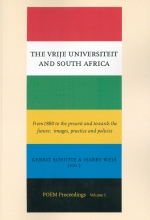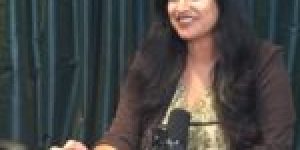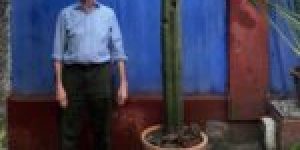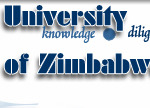The History Of The Relationship Between The Vrije Universiteit And South Africa: Introduction
No Comments yetSAVUSA POEM Proceedings. Rozenberg Publishers 2005 – ISBN 90 5170 587 5
Introduction
In 2005 the Vrije Universiteit Amsterdam (VU) celebrates its 125th anniversary. It is a celebration in style: a yearlong programme which contains both scholarly elements – every faculty for instance has been asked to organise an international conference in a particular month of the lustrum year around a specific and fitting theme – and festive elements, like for instance an alumni-day ending with a concert of the world famous Portuguese singer Christina Branco. The celebrations are accompanied by the publication of a number of commissioned books about various historical aspects of 125 years of Vrije Universiteit Amsterdam. One of them is a study of the relations between the Vrije Universiteit Amsterdam and South Africa. This relationship dates back to the very beginning of the VU in 1880 – the year in which the First Anglo-Boer War started! The University History Committee asked historian Prof. G.J. Schutte to write this book, entitled De VU en Zuid-Afrika, 1880-2005.[i] The book has been published in December 2005.
In the book Prof. Schutte tells in detail the history of the relationship between the VU and South Africa. This relationship started 125 years ago, in 1880, as a result of the rediscovery by the Dutch of their Afrikaner broedervolk, and a kindred feeling of stamverwantschap (kinship) with the young nation of the Dutch Afrikaners, that was cherished for many decades. The Dutch ardently supported the Boer Republic’s struggle against British imperialism during the Anglo-Boer War of 1899-1902, and also the resulting movement for cultural, social and political emancipation of the Afrikaner people. For the VU academics, this affinity contained an extra value, that of sharing a common religion with the Afrikaners, a common Calvinist tradition and conviction. From 1900 onwards, the VU played an important role as alma mater for generations of Afrikaners, especially for theologians of the Nederduitse Gereformeerde Kerk and the Gereformeerde Kerk. The academic knowledge that was acquired at the VU, was used to develop the South African universities (Stellenbosch and Potchefstroom, and many more) and Afrikaner society and culture.
In about 1960, a new period in VU history was set in motion. A gradual movement away from Kuyperian tradition and the closed group of ‘Calvinists’ could be observed. Critical remarks were made with regard to Kuyper’s Encyclopedia, his philosophy of science, his political and social principles and practice (‘pillarisation’). A new stance was taken on the role of the Christian in society, also in matters of colonialism, racism and the relationship between the First and the Third World. The general western urge for democratisation in those years triggered a change in the ideas on academic education, research and academic policy. The VU, though known for its classical and sometimes patriarchical education system, had since its founding been conscious of its being indebted to the emancipation of the kleine luyden (‘common people’) and considered social awareness as a principle.
In the turbulent debate on renewal and change that dominated most of the 1960s and 1970s, the traditional relationship between the VU and South Africa soon became subject of heated discussions. The apartheid policy, that had initially been accepted as the outcome of the specific South African historical context, called for a radical redefinition of viewpoints after the 1960 Sharpeville massacre. For some, this was a reason to immediately sever the ties with white South Africa, while others combined a critical debate with the Afrikaner counterparts on the true character of the Christian faith with the establishment of new connections with the ‘other’ South Africa. The honorary degree awarded to Rev. Beyers Naudé in 1972 and the rupture in the special relationship with the Potchefstroom University for Christian Higher Education (PU for CHE) (1974-1976) marked the end of an era and of a tradition.
At the same time, the VU started cooperating with a number of ‘black’ universities in Southern Africa. These newly established contacts were not alternatives in a normal sense; they were rather unorthodox, seen through the lens of traditional Humboldtian academic criteria. Projects were adapted to Africa’s social reality, and, in line with VU traditions, had an emancipatory purpose in the form of supporting academic development, embodied in the DOS (Dienst voor Ontwikkelings-samenwerking, later renamed as CIS: Centrum voor Internationale Samenwerking, Centre for International Cooperation).
South Africa’s change in 1990, leading to the democratic election of Nelson Mandela as the first black president in 1994, again marked the beginning of a new period in the relationship between the VU and South Africa. The restricted contacts of the previous decade have been replaced by the establishment of many new cooperative academic projects. In 2003 the Board of the VU decided that following the many contacts with South African colleagues on a faculty level, South Africa would be considered a target country in the internationalisation policy at the institutional level of the VU, with a strict academic mandate. Again, not primarily because of historical ties but mainly because almost all faculties at the VU are currently actively co-operating with South African colleagues. SAVUSA (South Africa-Vrije Universiteit-Strategic Alliances[ii]) is the outcome of that decision of the VU Board. But what type of ‘new’ academic knowledge and cooperation is the ‘new’ South Africa actually waiting for?
In an attempt to at least partially answer this question, Prof. Gerrit Schutte, supported by the Faculty of Arts, together with SAVUSA organised a mini-conference on 28 and 29 October 2004 (called a Publication Oriented Expert Meeting or ‘POEM’ in SAVUSA jargon). The purpose of the POEM was to look at the future of the relationship between the VU and South Africa, to investigate whether further continuation would be in the interest of the South African academics and to hear from the South African colleagues that were present, both academics and policymakers, what they expect of the VU if it will continue and maybe even expand the academic cooperation. This POEM certainly was a unique event in the cooperation between the VU and South Africa and also one of the very rare occasions on which a Dutch institution took up a primarily listening position. In order to cater for the broad spectrum of tertiary education in South Africa, South African academics and policymakers were invited, not only from the traditional partner institutions of the VU, (previously) Afrikaner institutions like Stellenbosch, Pretoria or Potchefstroom, but also from a (historically) English-speaking university (University of the Witwatersrand), a newly formed institution (Durban Institute of Technology) and South African policymakers in tertiary education from varying backgrounds (National Research Foundation (NRF) and National Advisory Council on Innovation (NACI)). An important policy maker from the Netherlands in this regard, the Netherlands Organisation for Scientific Research (NWO), was also invited to share its ideas concerning academic cooperation with South Africa. It was a historic meeting at the VU, in the sense that for many, if not most participants, it was the first time that they saw so many different stakeholders in South African and Dutch tertiary education and academic cooperation gathering together to discuss the direction of an individual institution’s policy with regard to cooperation with South African counterparts. The history of the relations between the VU and South Africa was of course an important ingredient in the various discussions: It is always crucial to know about traditions if you want to plan for and reflect on the future.
Policy processes are an ongoing thing, and policy formulation needs ongoing reflection. The proceedings of the POEM, published in this volume, are meant to offer just that: they hope to provide the reader with a sort of data-base to reflect academic policy formulation with regard to South Africa, both from South African and from Dutch viewpoints. Therefore the full texts of the various speakers are presented, in order to give every reader the opportunity to make up his or her own mind. This first volume in the SAVUSA POEM Proceedings aims to set the tone by providing readers with an interest in academic cooperation with South Africa with a type of ‘raw output’, which can be a source of inspiration when reflecting on the various issues regarding academic cooperation with South Africa.
Structure of the proceedings
The publication basically follows the programme of the POEM. The POEM consisted of three clusters that all touched the subject of ‘academic policy’, placed in the multiple social contexts of the relationship between the VU and South Africa. The programme offered a retrospective as well as an overview of current academic projects developed in South Africa by VU academics from the fields of arts and social sciences. Finally, possible academic policy recommendations and the role of the VU in a ‘new’ South Africa were anticipated on. In view of a further reflection on the relationship between the VU and South Africa, this part of the programme received most attention.
The first part, therefore, offers an analysis of the history of the relationship between the VU and South Africa. The first period in this history runs from 1880 to about 1960, 1970, when an empathic feeling of (religious and cultural) connection characterised the relationship between the VU and several South African institutions. The turning point that ended these 80 years of family-like relationship was in October 1972, when Beyers Naudé received an honorary degree at the VU.
The second period describes the political separation between the VU and its traditional South African partners, the establishment of a relationship with diverse Southern African institutions, such as the Universities of Potswood, Lesotho and Swaziland, as well as the then-called ‘black’ universities in South Africa, and the restoration of the relationship after 1990. A special paper highlights the founding of the DOS (Centre for Developmental Cooperation) in 1976 and the attempts from within the VU to form ties with tertiary institutions for black Africans, not merely in South Africa, but within the whole region of southern Africa.
The second part of the proceedings contains short introductions of four current academic cooperation projects at the VU, as an illustration, and explains how these projects could meet South Africa’s claim that academics need to help solving social problems in the country.
In other words: a ‘new’ South Africa requires a ‘new’ science. A number of South African participants have given their views on the significance (or absence, for that matter) of VU-traditions for this ‘new’ science.
The third and final part of the proceedings looks at the future of academic policy in South Africa, and more specifically, at the (potential) role of the VU, and the Netherlands in general, in this respect, as highlighted by NWO’s chairman Peter Nijkamp. Again, participants were sought from both South Africa and the Netherlands. They represent primary academic ‘policy’ organisations.
The SAVUSA POEM Series would like to inspire and even generate discussion amongst academics and policymakers about issues relating to academic cooperation with South African colleagues and institutions.
NOTES
i. For the other commissioned books, see http://www.125jaarvu.nl/publicaties.
ii. See for more information www.savusa.nl.
You May Also Like
Comments
Leave a Reply









